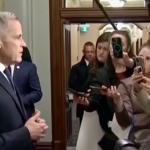Canadian Prime Minister Justin Trudeau has announced his resignation after nine years in power, citing internal party conflicts as the primary reason for his departure.
Trudeau’s unexpected resignation marks the end of an era characterized by both significant achievements and notable challenges. His tenure has seen Canada navigate complex social and economic landscapes, but recent domestic issues have overshadowed his administration’s successes.
Einar Tangen, a senior fellow at the Taihe Institute, highlighted two critical factors contributing to Trudeau’s waning support: Canada’s ongoing housing crisis and controversial immigration policies.
Under Trudeau’s leadership, the country has faced a mounting housing crisis, with affordability becoming a pressing issue for many Canadians. Skyrocketing property prices and a shortage of affordable housing options have placed significant strain on middle and lower-income families.
Simultaneously, the government’s immigration policies have been a source of contention. While aimed at promoting diversity and addressing labor shortages, critics argue that the rapid influx of immigrants has exacerbated the housing shortage and strained public services.
These domestic challenges, coupled with internal disputes within the Liberal Party, have eroded public trust and support for Trudeau’s administration.
Trudeau stated that stepping down was in the best interest of the party and the country, allowing for new leadership to address these pressing issues.
The resignation opens the floor for a potential reshuffling in Canada’s political landscape, as parties prepare to address the concerns that have dominated public discourse.
As Canada navigates this transitional period, the focus remains on resolving the housing crisis and reevaluating immigration policies to better serve the needs of its citizens.
Reference(s):
Housing crisis, immigration policy key to Trudeau's waning support
cgtn.com





